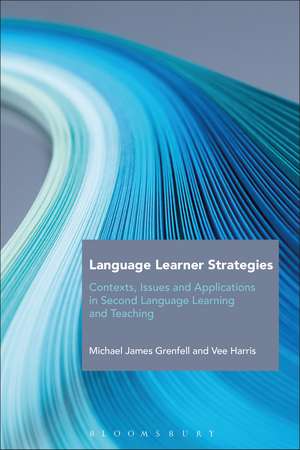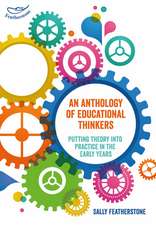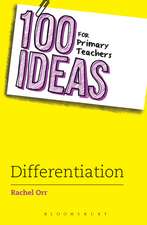Language Learner Strategies: Contexts, Issues and Applications in Second Language Learning and Teaching: Bloomsbury Guidebooks for Language Teachers
Autor Dr Michael James Grenfell, Vee Harrisen Limba Engleză Paperback – 18 oct 2017
| Toate formatele și edițiile | Preț | Express |
|---|---|---|
| Paperback (1) | 239.14 lei 3-5 săpt. | |
| Bloomsbury Publishing – 18 oct 2017 | 239.14 lei 3-5 săpt. | |
| Hardback (1) | 774.46 lei 6-8 săpt. | |
| Bloomsbury Publishing – 18 oct 2017 | 774.46 lei 6-8 săpt. |
Preț: 239.14 lei
Preț vechi: 274.14 lei
-13% Nou
Puncte Express: 359
Preț estimativ în valută:
45.77€ • 49.74$ • 38.47£
45.77€ • 49.74$ • 38.47£
Carte disponibilă
Livrare economică 01-15 aprilie
Preluare comenzi: 021 569.72.76
Specificații
ISBN-13: 9781474264136
ISBN-10: 1474264131
Pagini: 272
Dimensiuni: 156 x 234 x 19 mm
Greutate: 0.43 kg
Editura: Bloomsbury Publishing
Colecția Bloomsbury Academic
Seria Bloomsbury Guidebooks for Language Teachers
Locul publicării:London, United Kingdom
ISBN-10: 1474264131
Pagini: 272
Dimensiuni: 156 x 234 x 19 mm
Greutate: 0.43 kg
Editura: Bloomsbury Publishing
Colecția Bloomsbury Academic
Seria Bloomsbury Guidebooks for Language Teachers
Locul publicării:London, United Kingdom
Caracteristici
Highlights the implications for government policy, teacher education and curricular design
Notă biografică
Michael James Grenfell has held Chairs at Trinity College, Dublin, Ireland and the University of Southampton where he is now based. He is also Adjunct Professor at the University of Canberra, Australia. He has an extensive background of research on Language and Linguistics, and the work of Pierre Bourdieu. He is the author/ editor of several books including: Modern Languages Across the Curriculum (2002), Bourdieu, Language and Linguistics (2011); Language, Ethnography and Education (2012); and Bourdieu: Key Concepts (2012). Vee Harris is a Research Fellow at Goldsmiths College, University of London, UK, having previously led the PGCE Modern Languages course while Senior Lecturer there. Her many publications involve classroom-based studies and she has a special expertise in language learning strategy instruction.
Cuprins
IntroductionPart I: Principles and Practice1. The Case for Language Learner Strategies2. What Research Tells UsPart II: Strategies in PracticeSection A: Progress in Modern Languages: What Difference does Strategy Based Instruction make?3. The Role of Socio-Cultural Factors and Strategy Based Instruction4. The Role of Affective Factors and Strategy Based InstructionSection B: Beyond the Monolingual Learner of European Languages5. Learning a Third Language: What Learner Strategies do Bilingual Students bring?6. Strategies used to Memorise Mandarin Chinese CharactersPart III: Applications in Practice7. Strategy Based Instruction8. Shaping Learning: Curricula and Syllabuses9. Language Learner Strategies and Teacher EducationConclusionBibliographyIndex
Recenzii
A valuable resource for language teachers, teacher educators and researchers ... Grenfell and Harris add a personal aspect to their work by adopting a reflective approach, this makes the readers feel more connected to the issues discussed in their book. They manage to keep their readers engaged throughout ... Most importantly, they engage and invite their readers to reflect critically.
In this timely book, the authors offer a wide-ranging view of language learner strategies. They not only provide theoretical insights by relating strategies to evolving methods and principles of language teaching, but they also give fascinating examples of learner strategies projects conducted in classrooms. The book's consideration of the role of context in the deployment of language learner strategies, and its attention to strategies employed by bilingual learners are especially valuable. I'm sure it will be of interest to a range of readers, including teachers, teacher educators and researchers.
Grenfell and Harris demonstrate their savvy with regard to LLS theory, research, and practice in this timely look at the field. They provide a refreshing review of research, integrating it expertly with their own innovative research focused on an understudied group of foreign language learners, namely, middle schoolers, including a look at affect and at strategies for memorizing Chinese characters. The volume provides numerous ideas for further research.
Grenfell and Harris's treatment of language learning strategies achieves a remarkable integration of theory, research, and practice. The authors also balance breadth and depth, striking a tone one might describe as 'accessibly authoritative'. This is a text for all professionals in the realm of second language development.
This is a well-researched and engaging book, bringing together both cognitive and social perspectives on language learner strategies and making a convincing case for their centrality in learning and teaching. The insights into hitherto overlooked issues such as affect, third language learning and non-alphabetic writing systems, are refreshing and illuminating. The implications for pedagogy, curriculum design and teacher education are also well captured. This is a book I would highly recommend as valuable reading for pre- and in-service teachers alike.
In this timely book, the authors offer a wide-ranging view of language learner strategies. They not only provide theoretical insights by relating strategies to evolving methods and principles of language teaching, but they also give fascinating examples of learner strategies projects conducted in classrooms. The book's consideration of the role of context in the deployment of language learner strategies, and its attention to strategies employed by bilingual learners are especially valuable. I'm sure it will be of interest to a range of readers, including teachers, teacher educators and researchers.
Grenfell and Harris demonstrate their savvy with regard to LLS theory, research, and practice in this timely look at the field. They provide a refreshing review of research, integrating it expertly with their own innovative research focused on an understudied group of foreign language learners, namely, middle schoolers, including a look at affect and at strategies for memorizing Chinese characters. The volume provides numerous ideas for further research.
Grenfell and Harris's treatment of language learning strategies achieves a remarkable integration of theory, research, and practice. The authors also balance breadth and depth, striking a tone one might describe as 'accessibly authoritative'. This is a text for all professionals in the realm of second language development.
This is a well-researched and engaging book, bringing together both cognitive and social perspectives on language learner strategies and making a convincing case for their centrality in learning and teaching. The insights into hitherto overlooked issues such as affect, third language learning and non-alphabetic writing systems, are refreshing and illuminating. The implications for pedagogy, curriculum design and teacher education are also well captured. This is a book I would highly recommend as valuable reading for pre- and in-service teachers alike.






















